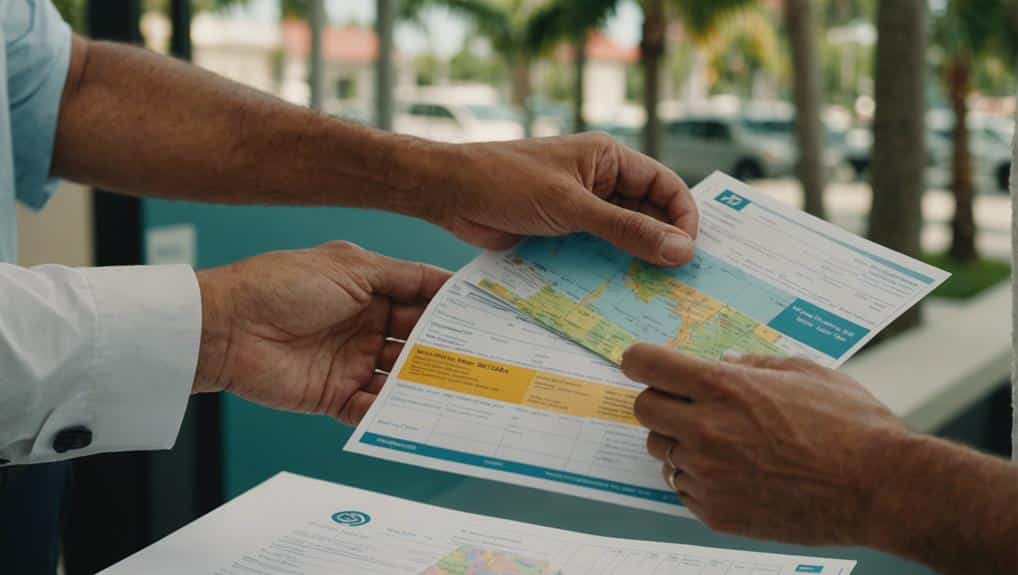To establish Florida residency, obtain a Florida driver’s license and present authentic documentation for identity, social security number, and residential address. Register to vote to demonstrate intent. File a notarized Declaration of Domicile with the county clerk. Establish physical presence by securing a Florida address and transferring driver’s license and vehicle registration.
Update mailing addresses with relevant agencies, financial institutions, and insurance companies. Enroll children in local schools, providing proof of residency. Open a local bank account and update IRS and former state tax authorities about your new residency: update wills, trusts, and powers of attorney. Continue to gain thorough guidance.
Key Takeaways
- Obtain a Florida driver’s license by presenting necessary documents and passing required exams.
- Register to vote and file a Declaration of Domicile at the county clerk’s office.
- Secure a Florida address with utility bills or lease agreements as proof of residency.
- Notify government agencies, financial institutions, and tax authorities of your new address.
- Update estate planning documents with a Florida attorney to reflect your new residency.
Establish Your Florida Residency
To obtain a Florida driver’s license, you must present genuine documentation proving your identity, Social Security number, and residential address. Acceptable documents include a certified birth certificate or a valid passport for proof of identity. A Social Security card or a W-2 form can prove your Social Security number. To establish your residential address, you must provide two documents: a utility bill or a lease agreement.
Florida complies with federal regulations and offers a verified ID-compliant driver’s license. This necessitates additional documentation to enhance security. Ensure all documents are legitimate when applying, as photocopies are not accepted.
Non-US citizens must demonstrate their legal presence in the United States by presenting valid immigration documents. This is critical for verifying your eligibility to apply for a Florida driver’s license.
Before issuance, you must pass a vision test and a written knowledge exam. The vision test ensures you meet the necessary visual standards for driving. The written knowledge exam assesses your understanding of Florida traffic laws and safe driving practices.
Essential Points to RememberRegister to Vote
Registering to vote in Florida is a significant step in establishing and solidifying residency status. You intend to make Florida your primary residence by completing your voter registration. This process can be initiated concurrently with obtaining your Florida driver’s license, streamlining your entry into the state’s legal framework.
The voter registration process is efficient, typically requiring only about five minutes. Ensuring active voter registration in Florida is essential, as it reinforces your residency claims. Participation in Florida elections underscores your commitment to the state and integrates you into the community, enhancing your sense of belonging.
To register to vote in Florida, visit the Florida Department of Highway Safety and Motor Vehicles (DHSMV) or utilize the online voter registration system. This procedure fortifies your intent to establish Florida as your primary residence. By voting in Florida, you manifest your residency intentions unequivocally, a critical element in any legal or administrative assessment of your residency status.
Maintaining active voter registration and participating in local and state elections will further substantiate your claims of establishing residency in Florida, thereby solidifying your position as a bona fide state resident.
File a Declaration of Domicile

Filing a Declaration of Domicile in Florida necessitates notarizing and recording the form at the county clerk’s office where you reside. This critical step in establishing residency in Florida involves the completion of a Florida Declaration of Domicile form. Make sure that you and your spouse, if applicable, sign the form jointly in the presence of a notary public. The notarization process confirms the validity of your signatures and your intent to make Florida your permanent residence.
Upon notarization, you must proceed to the county clerk’s office within your Florida county to officially record the document. The recording fee for this service typically amounts to $10. This fee is a nominal yet essential investment in your journey to establish residency in Florida.
Additionally, obtaining a Florida driver’s license within 30 days of filing a Declaration of Domicile is imperative. This requirement underscores your dedication to making Florida your permanent home. Moreover, registering your vehicles within ten days of establishing residency is obligatory.
Establish a Physical Presence
You must secure a permanent Florida address as your primary residence to establish a physical presence. Furthermore, you should transfer your out-of-state driver’s license to a Florida driver’s license. These actions provide concrete evidence of your intent to reside in Florida and support your claim of residency.
Secure a Florida Address
Securing a physical address in Florida is imperative for establishing legal residency and involves renting or purchasing a home within the state. A Florida address is not merely a formality; it substantiates your physical presence and indicates your intent to live in Florida. To establish residency, ensure your address is a physical residence, not a P.O. Box, as this differentiation is crucial for legal matters.
Documentation such as utility bills, lease agreements, or mortgage documents bearing your Florida address is proof of residency. These documents will be essential when seeking a Florida driver’s license and registering to vote. They verify your physical presence and demonstrate your commitment to becoming a Florida resident.
Your Florida address will also be your central point for receiving mail, registering vehicles, and fulfilling other legal requirements. Ensuring a legitimate, verifiable address is a foundational step in residency. This physical presence is the cornerstone of your new life in Florida, embedding you within the community and delineating your legal status within the state.
Transfer Driver’s License
Upon securing your Florida address, you must obtain a Florida driver’s license within 30 days to solidify your residency status. Begin by visiting a Florida Department of Motor Vehicles (DMV) office, where transferring your out-of-state driver’s license is essential. Present your current out-of-state driver’s license along with valid identification documents. Moreover, you must provide proof of your Social Security number.
To verify your new Florida address, bring two documents that confirm your residency—necessary forms include utility bills, bank statements, or rental agreements. This address verification is vital for issuing your Florida driver’s license. If you do not intend to drive, you may alternatively apply for a Florida State ID card, which also serves as a valid form of identification for residents.
Furthermore, it is imperative to register your out-of-state vehicle within ten days of becoming a Florida resident. This registration process ensures compliance with state laws and establishes your physical presence in Florida. Adhering to these steps emphasizes your commitment to becoming an active and recognized state resident.
Update Mailing Addresses

Ensuring your physical mailing address is updated to a Florida address rather than a P.O. Box is essential for establishing legal residency in the state. A physical FlorP.O. address is vital to demonstrate your intent to establish residency. Begin by updating your address on all official documents to reflect your new Florida address. This includes notifying government agencies, financial institutions, and insurance companies of your address change.
Doing so guarantees that your residency status is recognized and maintained. It’s important to inform these entities promptly to avoid any discrepancies that could jeopardize your residency claim. Regularly verify that your physical address is current on all relevant accounts and documents.
Establishing and maintaining a Florida address on official documents proves your intent to reside there, e. This step is essential and foundational in securing your legal standing as a Florida resident. Remember, consistency in your address across all official records will facilitate a smoother process and reinforce your residency status. Adhering to these guidelines ensures you effectively manage the address change and uphold your Florida residency.
Enroll Children in School
To effectively enroll your children in Florida schools, you must provide the requisite enrollment documents, including proof of residency and vaccination records. Adherence to specific school district boundaries is mandatory, and verifying your address within the designated district is imperative. This process substantively fortifies your intent to establish Florida residency.
Required Enrollment Documents
When enrolling your child in a Florida school, you must provide proof of residency, such as a Florida driver’s license or utility bills, along with the child’s birth certificate or passport for age verification. These documents are essential to initiate enrollment within your designated school district. The proof of residency must be current and indicate your Florida address, substantiating your compliance with residency requirements.
Additionally, you must submit detailed vaccination records. These records must demonstrate adherence to Florida’s vaccination requirements, guaranteeing your child is immunized according to state guidelines. Without proper immunization documentation, your child’s enrollment could be jeopardized.
Accurately completing school enrollment forms is imperative. These forms request thorough information, including emergency contacts and medical history. Ensure that all data provided is precise and up-to-date to facilitate a smooth enrollment process.
Be aware that residency requirements vary by school district; hence, verifying specific prerequisites with your local school authorities is prudent. Adhering to these protocols contributes to seamless entry into the Florida educational system, fostering a sense of belonging and compliance with state regulations.
School District Boundaries
Identify suitable school district boundaries by consulting official resources and contacting the local office to facilitate your children’s enrollment. In establishing Florida residency, comprehending school district boundaries is paramount. These boundaries dictate the schools your children are eligible to attend. Initially, research official maps and resources to delineate the precise school district boundaries pertinent to your new residence.
Engage with the local school district office to obtain detailed information on enrollment procedures. This step is vital to guarantee an efficient process. You’ll be required to furnish proof of residency, typically encompassing utility bills, lease agreements, or property deeds, to substantiate your domicile within the district. This proof validates your children’s eligibility to enroll in the designated schools.
When choosing a school, consider critical factors such as school ratings, proximity to your residence, and the availability of special programs. These considerations will significantly impact your decision, ensuring the selected institution aligns with your children’s educational needs and your family’s logistical preferences. Maintain meticulous records of all required documents to streamline enrollment and facilitate smooth integration into the Florida school system.
Open a Local Bank Account

Opening a local bank account in Florida is pivotal in affirming your residency and establishing significant financial ties to the state. Select a reputable bank or credit union within Florida to commence this process. Upon selecting your financial institution, make sure you present valid identification. Acceptable forms of identification include a Florida driver’s license, passport, or state I.D. The Documents substantiate your residency claim and facilitate the account-opening procedure.
After identity verification, you must make an initial deposit, as the bank’s policy dictates. This deposit activates your account and signifies your financial integration into the state. Utilizing your new Florida bank account for financial transactions is imperative. Conducting routine transactions through this account to further solidify your financial ties to Florida is advisable.
Additionally, ensure you receive all pertinent correspondence and necessary documents through your new bank account. This encompasses bank statements and other financial communications, tangible evidence of your residency. By meticulously adhering to these steps, you substantiate your Florida residency and fortify your connection to the state’s economic infrastructure, fostering a sense of belonging and compliance with state regulations.
Notify Tax Authorities
After establishing a local bank account, you must promptly notify tax authorities of your residency change to Florida. Begin by informing your former state tax authorities to prevent dual residency taxation. This notification ensures you won’t be subjected to former state taxation as a resident of both states. Use the following table to streamline your notifications:
| Authority | Action Required | Purpose |
|---|---|---|
| IRS | Update address to your new Florida address | Confirm tax documents are received |
| Former State Tax | Notify of change in residency | Avoid dual residency taxation |
| Florida Tax Agency | Confirm new residency status | Verify Florida tax obligations |
Update your address with the IRS to guarantee all tax documents are sent to your Florida address. This essential step ensures your tax filing processes remain uninterrupted. Additionally, notifying your former state tax authorities solidifies your change in residency, thereby preventing any unwarranted tax claims from your previous state.
Maintain detailed records of residency change notifications. These records serve as necessary documentation, protecting you from potential disputes about your residency status. Organized records bolster your compliance and demonstrate diligence in adhering to tax obligations. Remember, precise and timely notifications to the relevant state tax authorities fortify your legal standing and streamline your fiscal responsibilities as a Florida resident.
Update Estate Planning Documents

Updating all relevant documents with your new Florida address is imperative to guarantee your estate plan complies with Florida laws. This includes revising your Wills, Trusts, and Powers of Attorney to accurately reflect your Florida residency status. Engaging a Florida attorney to review and update these legal documents must ensure they adhere to state-specific regulations and requirements.
Your estate planning documents must explicitly reflect your intention to establish Florida residency. This step is critical for legal compliance and safeguarding your estate’s future administration under Florida laws. By incorporating provisions that align with Florida regulations, you enhance the enforceability and clarity of your estate plan.
Seek guidance from a qualified legal professional to navigate this intricate process. A Florida attorney can provide the necessary expertise to update documents effectively, ensuring your estate plan remains robust and compliant. Remember, this meticulous attention to detail fortifies your estate planning against potential disputes and guarantees that your wishes are honored within Florida’s legal landscape. By taking these steps, you affirm your belonging and commitment to your new Florida residency.
Frequently Asked Questions
How Do I Establish Residency in Florida?
To establish residency in Florida, record a Declaration of Domicile, obtain a driver’s license within 30 days, register to vote, maintain a physical address, and pay property taxes if applicable. These actions demonstrate your intent to reside.
What Do I Need to Register as a Florida Resident?
To register as a Florida resident, you must file a Declaration of Domicile, secure a physical mailing address, register to vote, obtain a Florida driver’s license within 30 days, and address applicable property taxes.
How Long Does It Take to Become a Resident of Florida?
To attain Florida residency, you must maintain a physical presence for six months. Expedited residency is achievable by obtaining a Florida driver’s license, registering to vote, filing a Declaration of Domicile, and demonstrating your intent.
What Is Proof of Residency in the State of Florida?
Proof of residency in Florida is the golden key to your new home. You’ll need a valid Florida driver’s license, utility bills, lease agreements, vehicle registration, voter registration, or Declaration of Domicile filed locally.
Conclusion
In conclusion, establishing Florida residency involves many necessary steps. Picture yourself with your new Florida driver’s license and voter registration card, feeling proud of your permanent residence. You can file your residency declaration at the county clerk’s office, ensuring your legal status is secure.
With your children thriving as students in local public schools, your family will enjoy the benefits of being Florida residents. Registering for a bank account and updating your Social Security information are crucial steps. An experienced Florida realtor can guide you, ensuring your property purchase goes smoothly.
Don’t forget to handle your vehicle registration and notify relevant institutions of your address change. Ensure all legal documents, like your will and power of attorney, reflect your new residency status. Updating your tax documents and voter registration will further confirm your claim of Florida residency.
By following these steps, you will achieve legal residency in Florida. An experienced realtor can help you navigate the process, from filing your residency form to enrolling your dependent children in school. This move will bring peace of mind and open new opportunities for you and your family in the Sunshine State.






